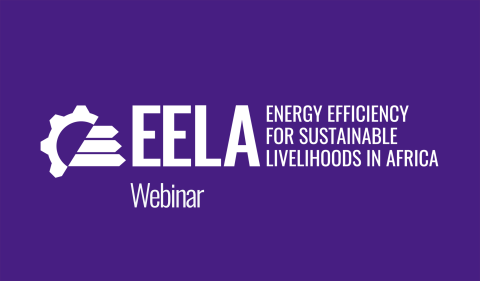WEBINAR
Webinar Series #11: Upscaling Uptake of EE Appliances and Equipment through MEPS and Labels Implementation

The webinar, the first organised under the EELA Program in continuity with the Webinar Series conducted during the EELA Project, brought together a lineup of experts to discuss the relevance and impact of adopting Minimum Energy Performance Standards (MEPS) and energy labelling. Aimed at strengthening capacities and fostering regional knowledge exchange, the session, which has been moderated by Mr. Readlay Makaliki, Lead Technical Expert at SACREEE, highlighted the multiple and synergistic benefits of these policies in advancing energy efficiency across countries.
Key highlights and inputs from participants:
Valeria Arroyave Cardozo, EELA Regional Project Manager, UNIDO - Welcome Remarks
Ms. Arroyave Cardozo opened the session by outlining the strategic goals of the webinar series, promoted by EELA to advance technical knowledge, foster regional collaboration, and engage national focal points. She emphasized the multiple and synergistic benefits of MEPS and energy labelling, highlighting the role of regional harmonization in supporting the increased removal of inefficient products, improving product quality, enhancing energy security, reducing emissions, and creating jobs across the supply chain.
Kudakwashe Ndhlukula, Executive Director, SACREEE
Mr. Ndhlukula emphasized that SADC’s principal stakeholders have mandated a decisive scale-up of energy efficiency efforts. The recently finalized and minister-endorsed SACREEE business plan identifies key challenges and calls for urgent advancement of energy efficiency measures, with a strong focus on enhancing Minimum Energy Performance Standards (MEPS) across various appliances to tackle critical energy issues.
Ndivhuho Tshikovhi, Project Associate, UNIDO
Mr. Tshikovhi presented the new EELA Program, building on the successes of the EELA Project to accelerate the impact of sustainable energy efficiency interventions on livelihoods. The program now also fosters energy-efficient initiatives within the industrial sector, promotes the adoption of innovative technological components and solutions in local value chains, and provides support for Country Windows through targeted national-scale interventions.
Michael Scholand, Viegand Maagøe
Mr. Michael Scholand discussed the role of MEPS and labels in driving energy efficiency. He explained how MEPS baselines are developed, emphasizing that their benefits extend beyond energy consumption to include product lifetime, performance quality, and comfort factors. This regulatory floor is complemented by energy labels, which serve as communication tools to inform consumers and create a market pull mechanism that shifts preferences toward higher performing, more efficient products. Scholand also presented various African energy label designs, highlighting the importance of incorporating cultural elements into their visual identity.
Lancerlot Riyano, NRCS
Mr. Riyano described in detail the implementation process and the functioning of the regulatory approach established by NRCS. He explained how the regulatory framework is structured to ensure compliance, including the steps taken for pre-market approvals, issuance of permits, and the ongoing market surveillance inspections. Mr. Riano also highlighted the role of the enforcement mechanisms, which empower regulators to conduct inspections and impose sanctions on non-compliant products
Millicent Masisi, Principal Inspector, NRCS
Ms. Masisi described the NRCS Energy Efficiency (EE) Database System, an online platform developed to simplify and digitize the submission of LOA applications. She highlighted how the application process has been streamlined and emphasized the critical role of the registered data in understanding and predicting trends and insights related to the energy efficiency features of products.